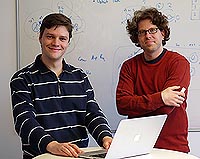Reaping the Benefits of Partial SDN Deployment in Enterprise Networks
 Dan Levin, FG INET, TU Berlin / T-Labs, Berlin
Dan Levin, FG INET, TU Berlin / T-Labs, Berlin
Marco Canini, T-Labs, Berlin
Monday, April 22, 2013
2:00 p.m., ICSI Lecture Hall
Abstract:
 Watch this talk on YouTube |
The operational challenges posed in enterprise networks, present an appealing opportunity for the software-defined orchestration of the network (SDN). However, the primary challenge to realizing solutions built on SDN in the enterprise is the deployment problem. Unlike in the datacenter, network upgrades in the enterprise start with the existing deployment and are particularly budget and resource-constrained. In this work, we investigate the prospect for partial Software Defined Network deployment. We present Panopticon, an architecture and methodology for planning and operating networks that combine legacy and upgraded SDN switches. Panopticon exposes an abstraction of a fully-deployed SDN in a partially upgraded legacy network, where the SDN benefits extend potentially over the entire network. We evaluate the feasibility of our approach through simulation on real enterprise campus network topologies entailing over 1500 switches and routers. Our results suggest that with only a handful of upgraded switches, it becomes possible to operate most of an enterprise network as a single SDN while meeting key resource constraints.
Bio:
Dan Levin is a Ph.D. candidate and research assistant with FG INET, Prof. Anja Feldmann's research group at TU Berlin / T-Labs, Germany. From 2010/10 - 2010/12, he was a visiting researcher at Deutsche Telekom Inc., R&D Lab Los Altos, USA. Dan obtained his master's degree in Computer Science in 2010 from TU Berlin on clean-slate wireless transport. He obtained his bachelor's degree in mathematics and computational biology at the Universiy of Pennsylvania between 2000 and 2004 after which he worked as a software developer at Andeen Hagerling Inc.
Marco Canini is a senior research scientist at T-Labs, a joint institute of TU Berlin and Telekom Innovation Laboratories. Marco obtained his PhD degree in Computer Science and Engineering from the University of Genoa in 2009 after spending the last year as a visiting student at the University of Cambridge, Computer Laboratory. He holds a laurea degree with honors in Computer Science and Engineering from the University of Genoa. He also held positions at Intel Research and Google, and he was a postdoctoral researcher at EPFL from 2009 to 2012.
